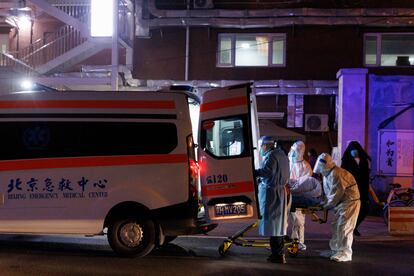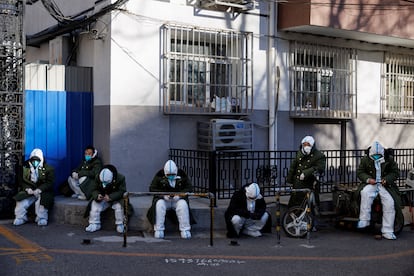China celebrates end of zero-Covid policy amid concerns over rising infections
Following intense social protests, the government has lifted several restrictions, which have resulted in mixed feelings of relief among an exhausted population


The sudden shift away from the zero-Covid policy in China has coincided with another wave of infections… and memes.
There are all kinds of jokes circulating on social media. One says: “If you live in Beijing and you don’t have at least 10 friends with Covid... do you have friends?”
In another, the Chinese people – as if they were a Greek chorus – ask the government when it will put an end to the strict policy:
People: “When will we open?”
Government: “Ten.”
People: “Ten months? Ten weeks?”
Government: “Nine, eight, seven…”
The countdown has been dizzyingly fast. After protests broke out at the end of November demanding an end to nearly three years of iron-fisted restrictions, President Xi Jinping used his security forces to crack down on the demonstrations. However, the demonstrations – the largest since Xi’s term began in 2012 – the Chinese Communist Party was forced to abruptly change policy.
Things have changed almost overnight. On Wednesday, December 7, the Council of State approved a series of new measures, including the reduction of mass testing and the possibility of recovering from mild cases of Covid-19 at home, rather than in a quarantine center. The obligation to present negative PCR tests or QR codes in several public spaces has also been eased. This element of hyper-control was particularly detested by the general population.
People are happy to have some freedom for the first time in years – but they are not in a state of ecstasy. The end of the regime’s draconian measures has brought about a strange anticlimax. In Beijing, the streets are half-empty. Many restaurants, schools and shops are closed or empty. With an increase in infections – possibly due to a lack of natural immunity among the population – and the remainder of some restrictions, plans can be cancelled at a moment’s notice if anyone tests positive, or has simply been in contact with someone who may be infected.
In the capital, there has been reported “panic” regarding shortages of medicine and long wait times at hospitals. The price of fever medication has skyrocketed – the State Administration for Market Regulation of China, the country’s market watchdog, is already investigating irregular increases. According to The Global Times – the English-language wing of the state-run People’s Daily – warnings were issues on Friday regarding the need to ensure price stability
“This is great news. I think the government has made a good decision,” says Huiqin Ma, 52, a professor at the Agricultural University in Beijing. She says that she wasn’t expecting such a quick change, but she’s grateful it came about.
“People could hardly take it anymore… the economy couldn’t stand the strict regulations any longer.” However, she acknowledges that there will be costs. “It will be painful, people will die – a small proportion, because the lethality has dropped. But most will be relieved.” And after this “great wave of omicron” – which will soon end – Chinese citizens will be packing their bags for “the year of the post-pandemic,” says this avid traveler, who is yearning for contact with the outside world.

Over the phone, Huiqin – a wine expert – tells EL PAÍS that her mother lives in the province of Hebei and has just experienced Covid, with the main symptom being a sore throat. According to her mother, the attitude in the northern province of China has gone from fear to expectation, after so many people have recovered without problems.
Official figures say that there are currently 22,200 people infected with Covid in China. But many analysts believe that the statistics have ceased to reflect reality, as the obligation to perform PCR tests has largely disappeared. The previous total control of the state has suddenly ceded to health self-management.
If one had slept for the past two weeks, it would be almost impossible to recognize Beijing upon waking up. The fences – utilized to confine potentially-infected individuals – have been removed, as have the countless kiosks that people were forced to visit to receive a daily PCR test. The unusual shortages and queues in pharmacies are largely due to the fact that there is a shortage of delivery people, in a country where, for the past three years, many have gotten used to ordering everything in small amounts to their residences.
“It’s good that they’ve lifted the restrictions and are allowing people to take care of their own health,” says a 20-something-year-old Beijing resident, who does not wish to be identified. He isn’t concerned about the rising infections – he’s about to take a flight to go skiing in a different province. Another young man – employed by a multinational firm – is also taking things in stride, noting that, among his colleagues, many are already infected: “I’m going to get Covid, too… it’s only a matter of time, 80% of people are going to get it.”
Feng Zijan – the former director of China’s Center for Disease Control and Prevention – argued at a conference at Tsinghua University in Beijing that a massive first wave in the post-restriction era would affect about 60% of the Chinese population (almost 850 million people) and, eventually, about 90% of Chinese people would ultimately end up infected.
Some fear a possible collapse of the Chinese hospital system, which may struggle to cope with rising infections in a post zero-Covid society. A study by Wigram Capital Advisors – referenced this week by the Financial Times – projects that, after the Chinese New Year holiday, there could be up to 20,000 daily deaths in March 2023. Official figures indicate that, during the zero-Covid policy, China only registered about 5,200 deaths. However, it is important to note that these official figures are not reliable, given the lack of transparency practiced by the Chinese Communist Party.
Beijing is planning a forced immunization campaign among the elderly – many of whom have not yet received a vaccine – in order to prevent deaths among the most vulnerable population.
“I think a lot of people are happy, but there are also a lot of people who are very worried about what comes next,” says Xinran Andy Chen, a Shanghai-based analyst at Trivium China. In his opinion, Beijing has orchestrated a “chaotic and disorderly” exit strategy, which did not come until Xi faced political pressure from the population.
As he is entering his 11th year in power, the Chinese president wanted to prioritize “social stability above all else.” Before he was sworn in for his third consecutive term by Communist Party leadership, social stability meant low death figures – even at the cost of freedom and quality of life. Now, it seems to mean boosting the economy and avoiding mass anti-regime protests at all costs.
Many believe that the change has come very late, yet they celebrate it and look to the future with optimism.
“It’s good for society, for people and for the economy,” a Chinese investor – who preferred to remain anonymous – stressed via phone interview with EL PAÍS. By extension, he adds, it will be “beneficial for Europe and the United States,” since it implies the return of China to the world.
This investor – who sits on the boards of various leading technology companies – estimates that a peak of infections will be reached in two or three weeks. And, from that moment onwards, things will improve. He acknowledges that there will be deaths, but that the numbers should be put in the context of a country of 1.4 billion inhabitants. He suggests keeping the champagne bottles corked for a few weeks, until the shock passes.
Sign up for our weekly newsletter to get more English-language news coverage from EL PAÍS USA Edition
Tu suscripción se está usando en otro dispositivo
¿Quieres añadir otro usuario a tu suscripción?
Si continúas leyendo en este dispositivo, no se podrá leer en el otro.
FlechaTu suscripción se está usando en otro dispositivo y solo puedes acceder a EL PAÍS desde un dispositivo a la vez.
Si quieres compartir tu cuenta, cambia tu suscripción a la modalidad Premium, así podrás añadir otro usuario. Cada uno accederá con su propia cuenta de email, lo que os permitirá personalizar vuestra experiencia en EL PAÍS.
¿Tienes una suscripción de empresa? Accede aquí para contratar más cuentas.
En el caso de no saber quién está usando tu cuenta, te recomendamos cambiar tu contraseña aquí.
Si decides continuar compartiendo tu cuenta, este mensaje se mostrará en tu dispositivo y en el de la otra persona que está usando tu cuenta de forma indefinida, afectando a tu experiencia de lectura. Puedes consultar aquí los términos y condiciones de la suscripción digital.








































